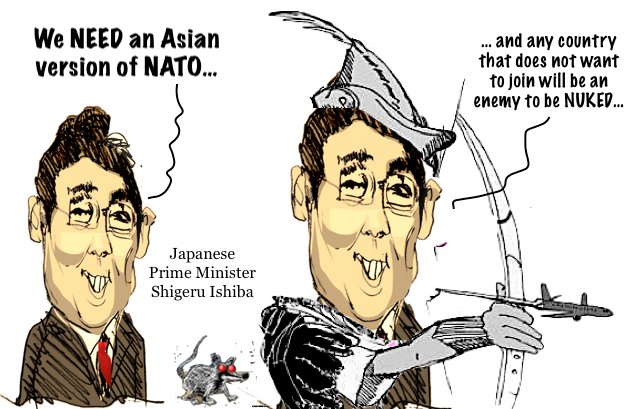Search
Democracy Links
Member's Off-site Blogs
NATO anywhere in the world is utterly fascist....

It is difficult to reconcile new Japanese Prime Minister Shigeru Ishiba’s expressions of concern for the security of his country with his advocation of an Asian version of NATO.
The two ideas are contradictory to say the least.
We need PM Ishiba’s NATO like we need a hole in the head… By Teow Loon Ti
Even without mentioning China, it is clear that the alleged threat to Japan’s security emanates from China. Since World War II, the only two significant wars that occurred in the Asian region, Korean and Vietnam, were foist upon the region by the United States. There is no reason for Japan to feel insecure over an imagined threat from China. In his first policy speech to the Japanese Parliament, PM Ishiba said that “… today’s Ukraine could be tomorrow’s East Asia” without direct reference to China. That hypothetical statement could find acceptance if it were articulated by a geopolitical analyst, but could be deemed provocative by the neighbouring nation.
He further reiterated his argument that the creation of an Asian NATO is key to Japan’s security. I find the idea of a military alliance of the nature of NATO in our part of the world utterly abhorrent. Why would a leader responsible for the welfare of his people import such a security busting idea from the other end of the world, from countries whose historical presence in the Asian region was marked by wars, gunboat diplomacy and colonisations? Does East Asia not have its own philosophies about how best to foster peace and security? Japan is as Confucian as its old writing was Chinese. Is not the very essence of Confucianism is premised on how to live in harmony with each other with mutual respect and propriety?
Alliances foster and aggravate war. World War I began in 1914 with the assassination of Archduke Franz Ferdinand, heir to the Austro-Hungarian Empire by a Serbian nationalist, Gavrilo Princip. Albeit that war was inevitable between the two nations, it could have remained a localised conflict. Instead, the Austro/Hungary and Serbia conflict morphed into a world war because other countries were drawn into the conflict, obligated by their military alliances. The war lasted about 4 years with a military and civilian casualty of between 15 to 20 million people. Today, we have the example of the Ukraine War, a proxy war fought by NATO against Russia; the very NATO concept that PM Ishida wishes to import into the East Asian region. We need NATO like we need a hole in the head.
Although Russia and China had expressed a “no limits friendship”, there is no formal alliance between these two nuclear powers. If there were, China would already have been actively participating in the Ukraine War instead of being labelled an “enabler”. I have often wondered whether Japanese PMs mistrust China because China’s economic and military ascendence carries overtones of the historical role that they played in the humiliation of China. If so, it could go a long way towards explaining the irrational fear that Japanese leader have for China; a fear that is concomitant with expectations of reprisal. The general attitude of the Chinese people towards this aspect of their historical experience seem not to have been queried and revealed; and the unwarranted suspicions remain a scourge in their foreign relations with China. Asked about the atrocities committed against them in WWII and beyond, educated Chinese will overwhelmingly say, “We can forgive, but cannot forget”.
There are two important convictions embedded in the statement. Firstly, that the Japanese have been forgiven by the majority of the Chinese people for the transgressions. Nonetheless, mutual suspicions remain. It is encouraging that China and Japan still have a good economic relationship. A statement by the Ministry of Foreign Affairs of Japan on the 24th of January 2024 says: “China is Japan’s largest trading partner, and one of the largest investment destinations for Japanese companies. Economic relations between Japan and China, including trade and investment, are very close.”. It is also indicative that as many as 2.4 million Chinese tourists visited Japan in 2023.
The second part of the statement “…but we cannot forget…”, reflect the important role that recorded history plays in informing the Chinese mind. They protest when Japanese leaders make visits to the Yasukuni Shrine to pay their respects to the convicted war criminals of WWII. It may be necessary to point out here that the South Koreans (who are allies of the US and Japan) who also suffered egregiously from Japanese colonialism and maltreatment in WWII are equally outraged by such visits. The question of how big a role that “not forgetting” a time when they were poor, vulnerable and humiliated has played as a motivator in their astounding economic and military growth remains moot.
When the Soviet Union broke up in 1991, there was no longer any justification for the continued existence of NATO. The fact that it did, and expanded further right up to the border of Russia, makes it reasonable to infer “containment” of Russia. War would break out in East Asia only if the US and its allies (Japan included) initiate or provoke one.
I find PM Ishiba’s idea of an Asian NATO and his statement that “…todays Ukraine could be tomorrow’s East Asia” not helpful in their bilateral relationship with China to say the least.
https://johnmenadue.com/asian-nato-a-threat-to-security/
YOURDEMOCRACY.NET RECORDS HISTORY AS IT SHOULD BE — NOT AS THE WESTERN MEDIA WRONGLY REPORTS IT.
- By Gus Leonisky at 22 Oct 2024 - 6:18am
- Gus Leonisky's blog
- Login or register to post comments
Recent comments
28 min 55 sec ago
4 hours 48 min ago
4 hours 54 min ago
5 hours 6 min ago
5 hours 25 min ago
5 hours 31 min ago
8 hours 40 min ago
9 hours 38 min ago
9 hours 46 min ago
23 hours 38 min ago